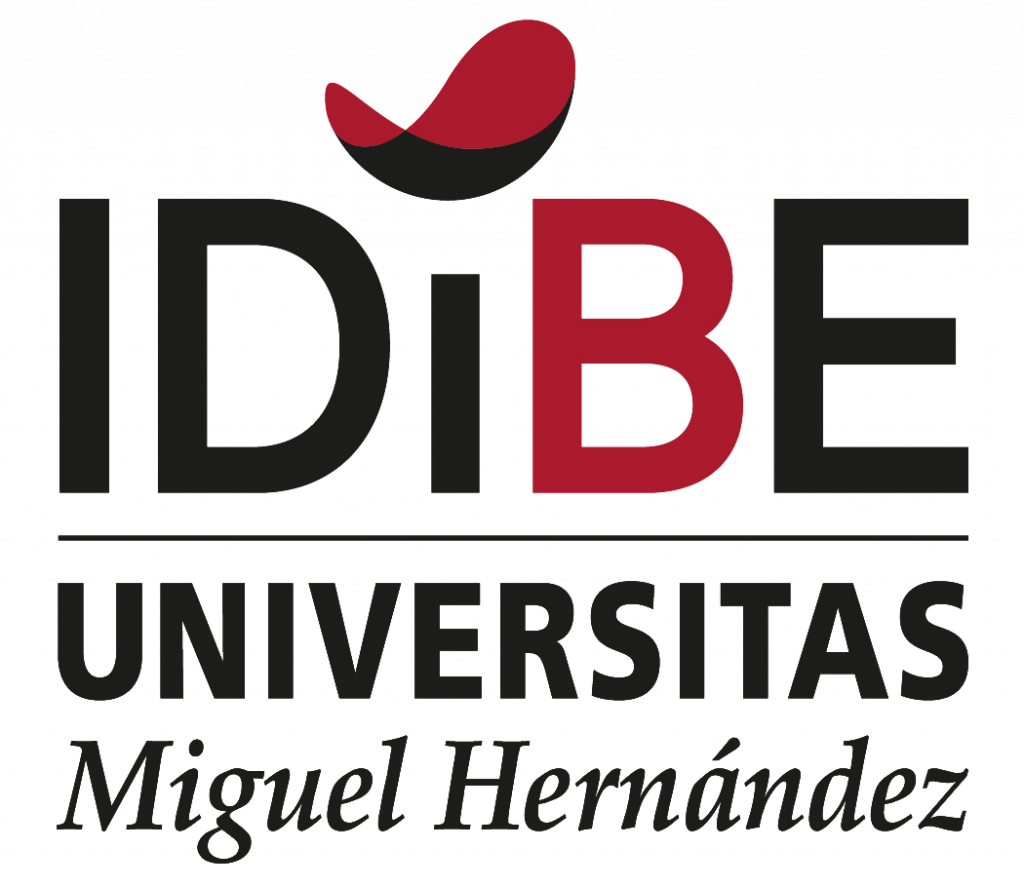The Institute of Research, Development, and Innovation in Healthcare Biotechnology of Elche (IDiBE, Instituto de Investigación, Desarrollo e Innovación en Biotecnología Sanitaria de Elche, (https://idibe.umh.es/about-us/)) carries out a multidisciplinary and transformative research program in the field of human and animal health.
IDiBE mission is to translate the generated biological and nanotechnology knowledge into products, services, and technologies for increasing society welfare. The ultimate goal is to provide solutions to societal health challenges by transforming our know-how using a market-oriented view.
The vision is to become a reference research centre of excellence in translational science as a strategy to promote research and training innovation, and thrust policy influence.
The IDiBE research program is organized into major research areas (https://idibe.umh.es/research/) that cover all activities carried out the multidisciplinary teams. Each area is structured in research lines focused on specific objectives that are accomplished through specific projects. The aim of this organisation is to effectively exploit the synergy brought about our multidisciplinarity. We promote internal collaborations, sharing of infrastructures, and productive use of all resources. This collaborative strategy increases our competitiveness allowing to undertake more ambitious projects.
- MOLECULAR DESIGN – covers three key areas: (i) biomolecular recognition and design that has as a main goal to investigate the physic-chemical properties of protein-protein and receptor-ligand interactions, particularly for ion channels and nuclear receptors, with the aim of improving drug design; (ii) nanobiotechnology developments is centered primarily in the design and validation of nanostructures useful for drug delivery and biosensor design; and (iii) design and development of bioactive molecules, covers from in silico methods for screening and lead optimization to establishing high throughput screening assays to test natural and synthetic compound libraries. Molecules are primarily characterized for therapeutic development, but pharmaceutical by-products (i.e. bioactive molecules with moderate-to-low potency/activity) are developed as cosmeceuticals for skin and haircare through our Skin Research Platform or founded spinoff/startup companies.
- MOLECULAR DIAGNOSIS, PROGNOSIS AND THERAPY – encompasses three key areas: (i) Diabetes research that focuses on the mechanisms underlying diabetes mellitus types I and II, and the influence of the environment on the etiology of this disease in collaboration with CIBERDEM. A main objective is to design therapeutics that contribute to reduce the societal burden of this pandemic disease; (ii) molecular pharmacology that is centered on validating therapeutic strategies for two major societal problems, (a) cancer, particularly glioblastoma, colorectal cancer and hepatocarcinoma (in collaboration with CIBEREHD) using both natural and synthetic molecules along with immune-based approaches, and, (b) chronic inflammation and pain that is focused on cirrhosis-induced hyperamonia and related disorders, and inflammatory conditions induced by obesity and metabolic disorders in collaboration with the CIBEROBN consortium. Chronic pain is centered in migraine and its sex dimorphism (3:1, women:men) and chemotherapy-induced peripheral neuropathy. (iii) Anti-infective strategies centered in antiviral therapeutics (vaccines and small molecules, that include human viruses of major prevalence, including SARS-CoV-2, cytomegalovirus (CMV), respiratory syncytial virus (RSV), Zika virus (ZIKV) and Dengue virus (DENV). Complementarily, we have a long-standing and potent RTD program on fish rhabdovirus that are becoming a tremendous problem in aquaculture.
- INDUSTRIAL DEVELOPMENTS OF HEALTH INGREDIENTS incorporate two key areas: (i) Environmental-friendly extraction form plants, herbs, and agricultural by-products, including incorporation of new fermentation processes to reduce sugar content, the use of flash-expansion technology for by-product separation, and the extraction processes to optimize the obtention of nutraceutics. (ii) Pilot industrial production of nutraceutics. Development of nutraceuticals and green health ingredients is ensured thanks to our pilot extraction plant that allow us to promote and increase to TRL5-6 for some products, and to use agricultural by-products promoting a circular and sustainable economy.
TECHNOLOGY PLATFORMS
IDiBE has organized its biotech know-how and singular infrastructures into 5 technology platforms (https://idibe.umh.es/services/) encompassing from in silico capabilities to industrial biotechnological developments. New infrastructures, equipment, and know-how are incorporated into IDiBE platforms to provide competitive services for the academia and industry. All services are fully aligned with the increasing innovation demands of a competitive market. The five platforms are the following:
-Skin Research Platform (SRP), focused on skin research and development of dermopharmaceutical and cosmeceutical ingredients, as well as in vitro assays for efficacy and safety testing.
-Molecular Modelling Platform (MiMIc), centred on in silico screening of compound libraries, lead optimization and molecular modelling.
-Translational Nanotechnology Platform (PATeNT), focused on developing of nanostructures for diagnostics and drug delivery.
-Ion Channel High Throughput Screening Platform (PuCCiNI), specialized in efficient screening of compound libraries using ion channel proteins as molecular targets.
-Pilot Extraction Plant for Biotech Process Optimization Platform (PERfOrM), for pre-industrial optimization of biotech extraction processes.
INFRASTRUCTURES AND EQUIPMENT
IDiBE is well equipped with the necessary infrastructures and equipment to cover all activities of our research program. In addition, we acquiring singular equipment to strengthen our current capabilities. Our policy is to share these assets to optimize their use and exploit synergies within our highly skilled, multidisciplinary staff.






